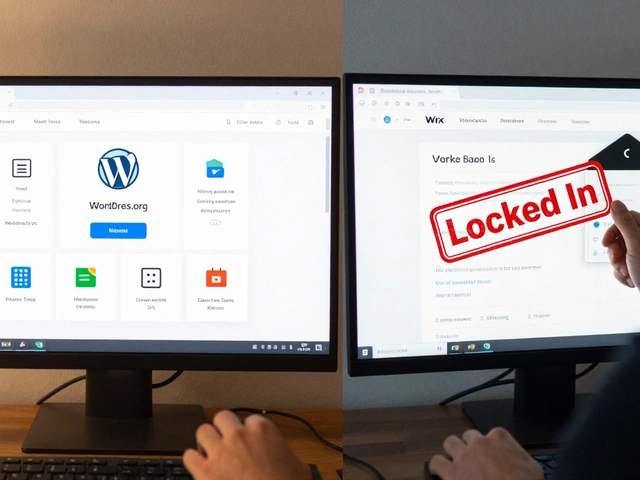So, you're pondering whether WordPress is headed for the sunset, huh? It's been the big cheese of website creation for ages, helping small businesses to big brands shine online. It's got this massive catalog of themes and plugins that make life so much easier for any web enthusiast.
But change is the only constant, right? Fancy new platforms pop up all the time, each claiming to be the next big thing. You've probably heard the buzz about some of them, promising sleek designs with less hassle. So, is WordPress still the real deal or just old news?
Let's explore what keeps WordPress ticking, especially in a bustling tech hub like India, where digital innovations are never far away. We'll dive into how it's adapting, keeping developers interested, and what it might need to do to stay at the top of its game. Whether you're a newbie or an old hand in the digital world, understanding these dynamics can be a game-changer.
- WordPress's Strong Reputation
- Emergence of New Platforms
- Adaptability of WordPress
- The Role of Themes
- Case Studies from India
- Future Trends in CMS
WordPress's Strong Reputation
When you think of building a website, WordPress is often the first name that pops into your head. There's a good reason for this. WordPress powers a whopping 43% of all websites globally—now that's something! This makes it the go-to choice for everyone from bloggers to giant corporations.
Why does WordPress have such a strong reputation in places like India? Well, it's all about flexibility and ease of use. Whether you're a total newbie or a seasoned developer, it's got tools tailored for all skill levels. Its open-source nature invites customization, giving developers the freedom to tweak away until it fits just right.
Plus, the community is a big deal. We're talking about thousands of developers constantly updating and securing the platform. This ecosystem keeps it not just alive but kicking—ensuring that WordPress themes in India and beyond stay fresh and relevant.
- Easy to Use: You don’t need to be a tech wizard to set up a basic blog or even launch a full-fledged online store.
- SEO Friendly: Packs in tools that help your page rank higher in search engines—huge for reaching more eyeballs.
- Vast Plugin Directory: From adding contact forms to enhancing security, there's a plugin for pretty much everything you can think of.
Some folks dig deep and use WordPress to create not just websites but full-fledged applications too. Consider this; the platform has been evolving consistently since 2003, showcasing amazing adaptability by integrating the latest web technologies.
Numbers speak volumes, huh? In India, WordPress reigns among developers for its robust multi-language support, essential in a country with such diverse linguistic backgrounds. So the next time you're setting up a site and thinking about which CMS to choose, remember there's good reason behind WordPress's tried-and-true reputation.
Emergence of New Platforms
Let's face it, folks: there's no shortage of website builders vying for attention these days. Platforms like Wix, Squarespace, and Shopify are making a splash, each offering their spin on easy, drag-and-drop website creation. They’re sleek, often come with less fuss, and promise users a visually appealing website without needing to be a coding whiz.
These newer platforms are turning heads with their user-friendly interfaces and rapid setup times. For small businesses especially, the idea of setting up an online store with Shopify, or a portfolio with Squarespace, without wrestling with endless plugins sounds pretty tempting.
Now, you might be asking yourself, are these platforms really giving WordPress a run for its money? They certainly boast some fancy tools and a straightforward design approach, but they rarely match WordPress’s versatility and extensibility. WordPress remains the king with a vast library of themes and customizable plugins, offering deep control over every aspect of a site.
| Platform | Main Features | Popularity |
|---|---|---|
| Wix | Drag-and-drop, App Market | 200 million users |
| Squarespace | Design-focused, Blogging | 3.79 million users |
| Shopify | E-commerce, Secure Payments | 4.2 million merchants |
Each platform has its charm and target audience, but they also have limitations, especially when scaling a website's features or moving beyond basic designs. This is where WordPress shines, especially in a diverse market like India, where developers appreciate its open-source nature and strong community support. So, while new platforms continue to emerge with flashy promises, WordPress’s well-rounded capabilities and flexibility keep it competitive. As these new players step onto the court, it’s clear that they contribute to an exciting, evolving landscape rather than signal the end of the WordPress era.
Adaptability of WordPress
Alright, let's get into why WordPress keeps rolling with the punches. First off, its open-source nature is a game-changer. Imagine having a platform where anyone from India or anywhere in the world can tweak the code. This means endless possibilities to customize and innovate without hitting a wall.
One of the coolest things about WordPress themes is how they're tailored to fit just about any need. Running a blog, a shop, or a showcase? There's a theme for that, and if you don't find the perfect fit, you can customize one till it’s just right. This adaptability is like having a wardrobe where outfits adjust themselves—super handy!
Another gem is the community behind WordPress. We're talking about developers, designers, and users constantly creating plugins that do all sorts of awesome things—from boosting SEO to enhancing site performance. With these plugins, WordPress can morph to fit whatever you need, which is a big reason why it’s hard to see it vanishing anytime soon.
Here's a quick lens on security: Yeah, WordPress sites have been targets for attacks, but its community is pretty sharp about it. Regular updates help patch vulnerabilities, keeping it safer for everyone using it, especially in tech-savvy areas like India.
Plus, check out this flexibility in action:
- Want a multi-language site? WordPress can do it.
- Need e-commerce features? Install a plugin like WooCommerce.
- Concerned about SEO? There are killer plugins like Yoast SEO to help with that.
This DIY approach lets businesses in India, from startups to well-established ones, play in the online field without spending a fortune. WordPress's adaptability is one of those unsung heroes that keep it current despite new exciting alternatives making their way to the scene.

The Role of Themes
WordPress themes are like the personality your website wears. They determine what your site looks like, how it feels, and even how it works on the back end. In a place like India, where online presence is booming, the right theme can make or break your site’s success. With a vast repository of themes, WordPress lets you easily tweak your site’s style without needing a computer science degree. This flexibility is a lifesaver for business owners who want to focus on their brands, not just the tech.
What's great is that themes aren’t just about looks—they play a huge role in user experience and SEO too. Many themes come handy with responsive design, meaning they automatically adjust to fit any screen size. That’s crucial if you want to reach folks browsing on everything from desktops to smartphones. Plus, certain themes are built with SEO in mind, helping your site pop up better on search engines, like using strategically placed keywords.
And there's serious innovation going on in the theme world. Developers are constantly updating and rolling out new designs that cater to the tastes and needs of Indian users. Want an e-commerce site that’s visually appealing? There’s a theme for that. Need something more corporate-looking with multilingual support? Yup, WordPress has got you covered.
- Adaptability: WordPress themes can be customized to fit any business need, enhancing their appeal.
- SEO Friendly: Many themes are built with SEO features to improve your site's visibility.
- Responsive Design: Most modern themes automatically adjust to different devices, ensuring a smooth user experience.
- Ease of Use: Choose and adapt themes without diving into complex coding.
In a bustling market like India, this versatility ensures WordPress remains a top choice for many developers and businesses alike. By keeping up with emerging trends and user demands, WordPress themes continue to provide a solid foundation for any website looking to stand out.
Case Studies from India
India has seen a massive boom in digital ventures over the last few years, and old faithful WordPress has been at the forefront of this transformation. Take the example of Teach for India, an educational nonprofit that's been making waves with its WordPress-powered site. They needed a platform that could not only handle heavy traffic but also be flexible enough to evolve with their growing needs. Thanks to the wide array of WordPress themes available, they could tailor the site’s design to reflect their vibrant mission and easily add functionalities as they grew.
Another interesting case is that of Zomato, the popular food directory and delivery service. While their mobile app is top-notch, their website is mainly on WordPress. Why? The robust content management capabilities allow them to frequently update restaurant information and user-generated reviews seamlessly. This adaptability is crucial for a fast-paced market like India.
Then there's Tata Motors, one of the country's automobile giants, who have turned to WordPress for their blog. The need to engage effectively with their audience led them to choose WordPress for its simple yet powerful blogging interface and SEO-friendly tools. This helps them connect with potential buyers and keep them updated on industry trends and new offerings.
Here's a little nugget of info: as of 2024, about 42% of all websites using a content management system in India were running on WordPress! That’s quite significant, showing how this platform has cemented its place here. Companies across sectors, from education to automotive, are trusting WordPress to hold the fort for their online presence.
These cases highlight a broader trend of WordPress evolving alongside India’s expanding digital marketplace. While new competitors frequently pop up, the trust and flexibility WordPress provides seem to give it an enduring edge in many sectors.
Future Trends in CMS
Okay, so what’s cooking in the world of Content Management Systems (CMS)? You'd think with all the tech whirlwind around us, things would be shaking up pretty fast. And you’d be right. The need for speed and efficiency in website management is driving some cool advancements, and WordPress is right in the mix, trying to keep its edge.
First off, there's a big push for headless CMS. Imagine your website data being more flexible, accessed from anywhere, like through mobile apps or even wearables. WordPress is diving into this trend with its REST API, letting you use your site’s content in new and innovative ways.
Then we've got AI and machine learning starting to weave their magic. Automation in content personalization is becoming huge. With smarter content recommendations based on user behavior, websites are serving up exactly what you want before you even know you want it. Talk about mind reading!
And hey, let’s not forget the user experience. As more people switch to mobile-first browsing, CMS platforms must ensure their themes are responsive and lightweight. WordPress themes from India are cranking up the focus on mobile optimization, aiming for that slick interface that keeps users hooked without speed bumps.
- More site builders integrating with WordPress to ease the designing woes.
- Stronger emphasis on cybersecurity! With so much data floating around, keeping up with secure practices is a must.
- User interfaces becoming cleaner and more intuitive, letting even non-techies manage their content seamlessly.
Now, fun fact: A recent survey showed about 40% of users consider switching their CMS within the next year. Why? They want lightning-fast load times, seamless integrations, and maybe just a fresh start.
So, whether you're on the WordPress bandwagon or eyeing alternatives, staying on top of these trends means your website won't just survive but thrive. Keep an eye out; the CMS scene is as lively as ever!



